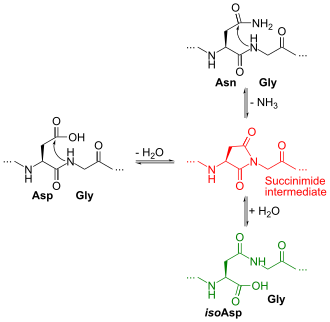Deamidation
Deamidation is a chemical reaction in which an amide functional group is removed from an organic compound. This process is significant in both organic chemistry and biochemistry, particularly in the modification of proteins. Deamidation can affect the structure and function of proteins, leading to alterations in their biological activity, stability, and half-life.
Overview
In the context of biochemistry, deamidation is a post-translational modification where the amide group of the amino acids asparagine (Asn) or glutamine (Gln) is hydrolyzed to form aspartic acid (Asp) or glutamic acid (Glu), respectively, and ammonia. This reaction can occur spontaneously under physiological conditions, and its rate can be influenced by factors such as pH, temperature, and the primary and secondary structures of the protein.
Significance in Proteins
Deamidation can play a critical role in the aging and degradation of proteins. It is one of the most common chemical modifications that occur in proteins during aging and can lead to a loss of function or altered biological activity. For example, deamidation in enzymes can result in decreased catalytic activity, while in structural proteins, it can affect the integrity and mechanical properties of tissues.
In the pharmaceutical industry, deamidation is a critical consideration in the development and storage of protein-based drugs. The stability of these drugs can be significantly affected by deamidation, impacting their efficacy and shelf life. As such, understanding and controlling deamidation is essential for the development of stable protein formulations.
Mechanism
The mechanism of deamidation involves the nucleophilic attack of water on the carbonyl carbon of the amide group, leading to the release of ammonia and the formation of a carboxylic acid. The reaction can proceed through either a direct hydrolysis pathway or through a cyclic succinimide intermediate, which is more common for asparagine residues. The succinimide intermediate can further hydrolyze to form either aspartic acid or isoaspartic acid, with the latter being an isomer that can significantly alter the protein's structure and function.
Detection and Analysis
The detection and analysis of deamidation in proteins can be challenging due to the subtle changes it induces in the protein structure. Techniques such as mass spectrometry (MS), amino acid analysis, and peptide mapping are commonly used to identify and quantify deamidation. These methods can provide detailed information on the extent and specific sites of deamidation within the protein molecule.
Conclusion
Deamidation is a critical post-translational modification that can significantly impact the structure, function, and stability of proteins. Its role in protein aging, degradation, and pharmaceutical stability makes it a key area of study in biochemistry and protein chemistry. Understanding the mechanisms, consequences, and methods of detection of deamidation can aid in the development of strategies to mitigate its effects on protein function and drug efficacy.
Transform your life with W8MD's budget GLP-1 injections from $125.
W8MD offers a medical weight loss program to lose weight in Philadelphia. Our physician-supervised medical weight loss provides:
- Most insurances accepted or discounted self-pay rates. We will obtain insurance prior authorizations if needed.
- Generic GLP1 weight loss injections from $125 for the starting dose.
- Also offer prescription weight loss medications including Phentermine, Qsymia, Diethylpropion, Contrave etc.
NYC weight loss doctor appointments
Start your NYC weight loss journey today at our NYC medical weight loss and Philadelphia medical weight loss clinics.
- Call 718-946-5500 to lose weight in NYC or for medical weight loss in Philadelphia 215-676-2334.
- Tags:NYC medical weight loss, Philadelphia lose weight Zepbound NYC, Budget GLP1 weight loss injections, Wegovy Philadelphia, Wegovy NYC, Philadelphia medical weight loss, Brookly weight loss and Wegovy NYC
|
WikiMD's Wellness Encyclopedia |
| Let Food Be Thy Medicine Medicine Thy Food - Hippocrates |
Medical Disclaimer: WikiMD is not a substitute for professional medical advice. The information on WikiMD is provided as an information resource only, may be incorrect, outdated or misleading, and is not to be used or relied on for any diagnostic or treatment purposes. Please consult your health care provider before making any healthcare decisions or for guidance about a specific medical condition. WikiMD expressly disclaims responsibility, and shall have no liability, for any damages, loss, injury, or liability whatsoever suffered as a result of your reliance on the information contained in this site. By visiting this site you agree to the foregoing terms and conditions, which may from time to time be changed or supplemented by WikiMD. If you do not agree to the foregoing terms and conditions, you should not enter or use this site. See full disclaimer.
Credits:Most images are courtesy of Wikimedia commons, and templates, categories Wikipedia, licensed under CC BY SA or similar.
Contributors: Prab R. Tumpati, MD

